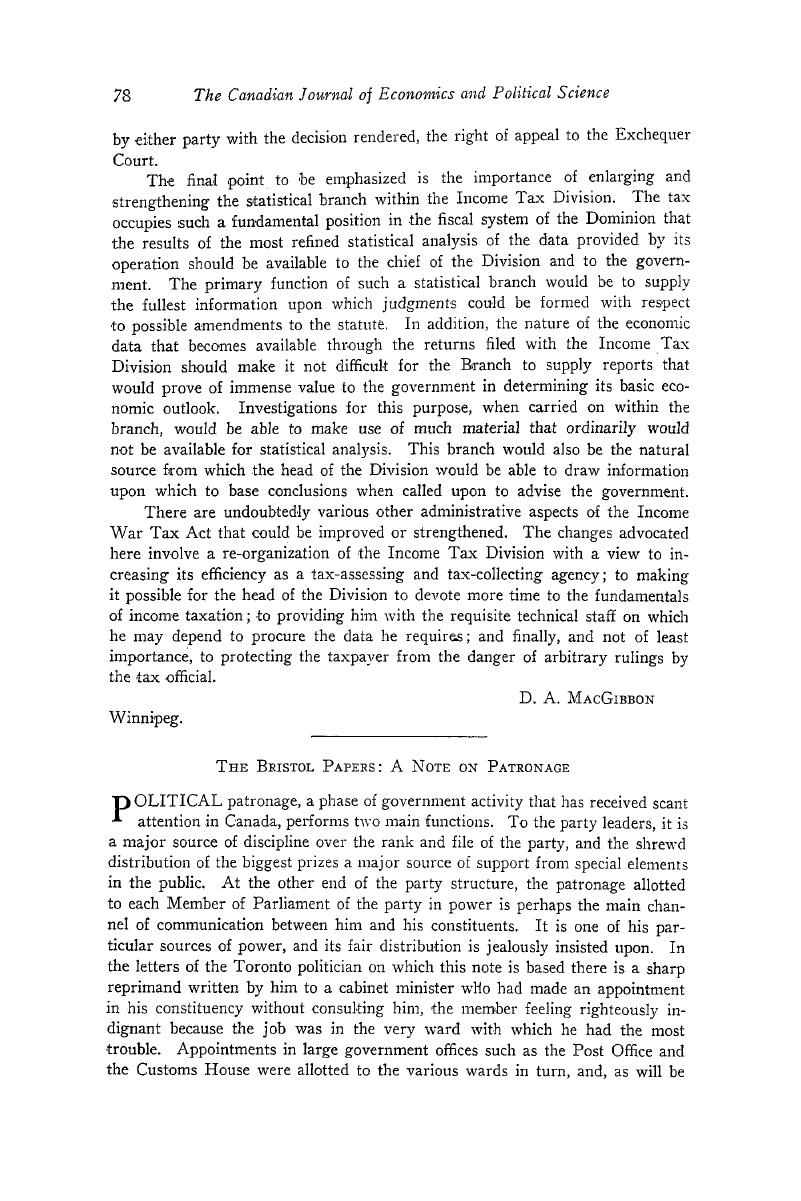No CrossRef data available.
Article contents
The Bristol Papers: A Note on Patronage
Published online by Cambridge University Press: 07 November 2014
Abstract

- Type
- Notes and Memoranda
- Information
- Canadian Journal of Economics and Political Science/Revue canadienne de economiques et science politique , Volume 12 , Issue 1 , February 1946 , pp. 78 - 87
- Copyright
- Copyright © Canadian Political Science Association 1946
References
1 Mr. Armour, Bristol's brother-in-law, was the son of the Honourable J. D. Armour, of the Supreme Court of Canada. He was a Conservative and unsuccessfully contested West Northumberland in 1904. He was also Bristol's official election agent for at least one election, that of 1911, which, by the way, cost Bristol personally $5,765.16.
2 Bristol sought the party nomination for his constituency both for federal and provincial elections in 1904, losing by a narrow margin each time. In 1905 E. F. Clarke, the federal member died, and Bristol was returned by acclamation.
3 The Bristol papers are packed, in no apparent order, mainly in about forty large boxes in the Department of Political Economy, University of Toronto. There are also some important fragments of political correspondence in the Ontario Archives. The latter pieces are readily accessible; the former have recived no attention beyond that required to put them in boxes. It is probable that the correspondence in these two places by no means comprises the total of Bristol's private papers.
4 Constitution of the Liberal Conservative Association of the City of Toronto, adopted 1892.
5 The organizing secretary was the son of one of the central figures in the formation of the Liberal Conservative Association in 1872, and was appointed Conservative organizer for Toronto in 1907, and for Ontario in 1914. He had been “educated” in political organizing in New York and Chicago, whither the party sent him to pick up useful information. His anonymity here is at his own request, and I must acknowledge a debt to him for valuable information given me in personal interview.
6 The Jewish vote in Bristol's constituency was pro-Conservative, according to an opponent. See Canadian Annual Review, 1908, p. 180.Google Scholar
7 It is not clear whether this local responsibility extended also to financial matters. While there are no details on specific financial affairs in the Toronto area, there are two instances dealing with finances that give no hint of an established practice, perhaps because they are both exceptional cases. In 1914, elections at South Oxford and East Lambton necessitated a recount and Bristol was retained by the Central Association to argue the Conservative case. When he submitted his bill to a Toronto party man, however, it was accepted but with the protest “I think the local people ought to pay their own bills.” The latter practice was followed in the federal campaign of 1921, when the national publicity committee considered circularizing voters by mail from Ottawa but rejected the idea on the grounds of expense, deciding to leave the costs of distributing literature to the local organizations. In the campaign of 1911, the expense of hiring detective agencies, to prevent apposing parties from using various individuals as impersonators of voters, was borne by the central organization.
8 The number of persons naturalized must have run into hundreds. In Bristol's files for February 7, 1908, for example, there is a paper entitled “list of aliens naturalized … ——by (the organizing secretary)” and there follow sixty-four names—all naturaJized on one day!
9 The organization of Italian and Jewish sections of his constituency (whose citizens provided the bulk of these naturalized persons) was a matter to which Bristol gave much time in his earlier years as an active politician. The Italian vote was substantially Liberal, but the Jewish vote was unorganized and both Bristol and the party organizer (who was secretary of Bristol's ward association during the latter's presidency) went after it with considerable success.


